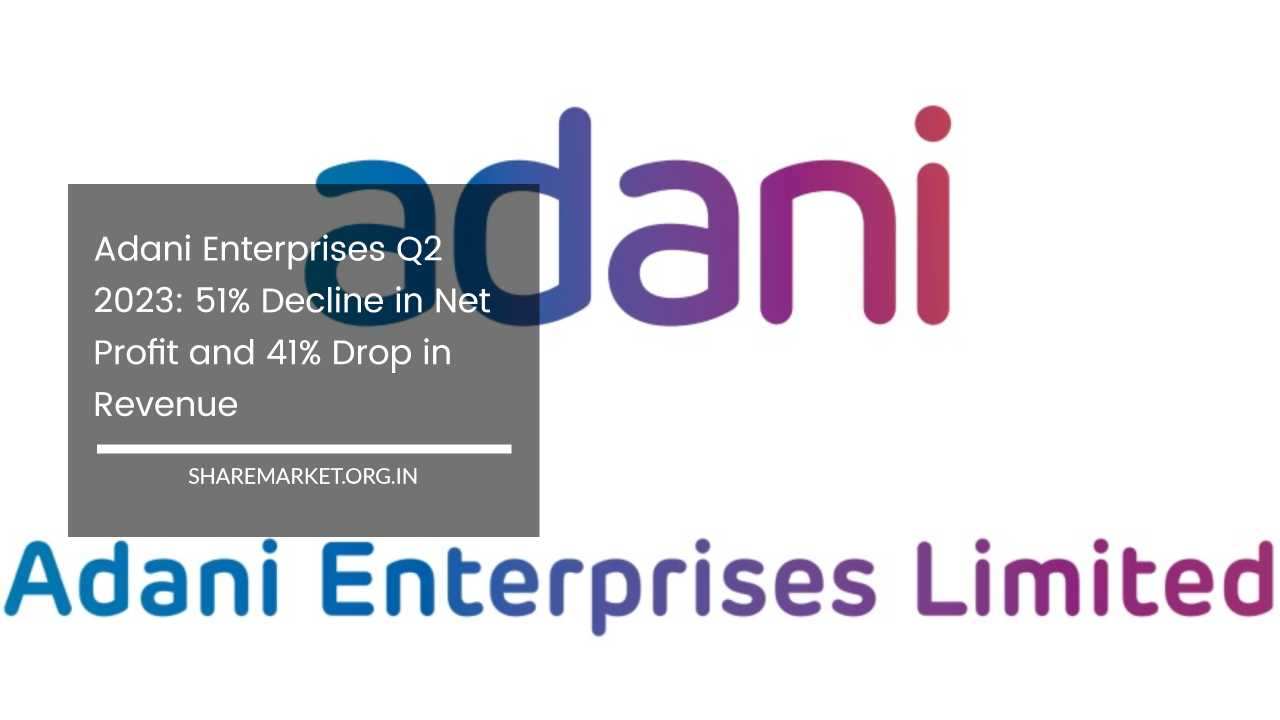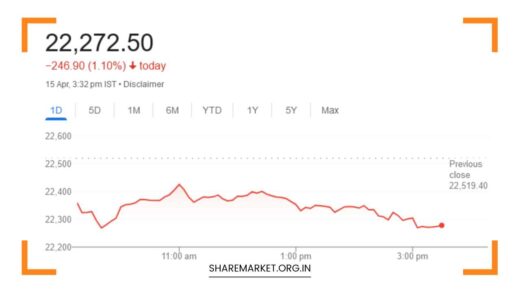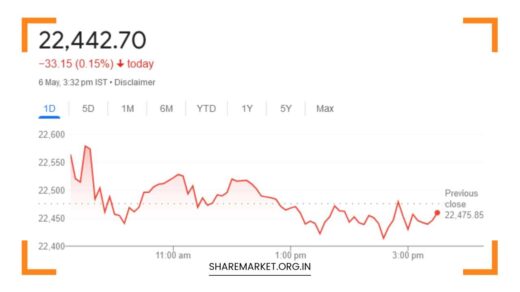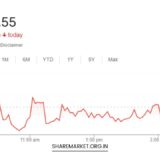Adani Enterprises Q2 2023: 51% Decline in Net Profit and 41% Drop in Revenue

Adani Enterprises Q2 2023
Adani Enterprises Q2 2023: A Detailed Analysis
On November 2, 2023, the financial world was closely watching Adani Enterprises, a significant player in the Indian business landscape.
On that day, the company’s shares closed at Rs 2,213 on the Bombay Stock Exchange (BSE), registering a marginal decline of 0.22%.
This event marked a moment of both concern and curiosity as stakeholders, investors, and analysts sought to unravel the company’s financial performance, especially in the context of its performance in the September 2023 quarter.
The Q2 2023 results for Adani Enterprises painted a sobering picture of its financial health. The consolidated net profit of the company saw a substantial decline of 50.57%, falling to Rs 227.82 crore.
In comparison, the same quarter in the previous year had seen a robust net profit of Rs 460.94 crore. The most pressing question on everyone’s mind was, what had caused this sharp drop in profitability?
The primary culprit, as disclosed by Adani Enterprises in an official exchange filing, was the fall in coal prices.
This fall had a domino effect on the company’s overall revenue, which also experienced a significant 41.01% decrease, shrinking to Rs 22,517.33 crore during the same period. In contrast, the previous year’s revenue had been substantially higher, reaching Rs 38,175.23 crore.
Despite these concerning financial figures, there was a glimmer of hope. Adani Enterprises reported that its EBITDA, a crucial financial metric, had displayed resilience during the challenging period.
It increased by an impressive 39% to reach Rs 2,979 crore in the September quarter. However, this resilience couldn’t prevent a minor drop in the company’s share value, closing at Rs 2,213 on November 2 with a 0.22% decline on the BSE.
A significant concern raised by the Q2 results was the impact of falling coal prices on Adani Enterprises. This prompted questions about the company’s diversification efforts and its ability to adapt to changing market conditions.
In an official statement released by the Adani Group, it was underlined that substantial systemic changes were underway, primarily related to incubating businesses. Adani Enterprises encompasses various sectors, including energy, utility, and transport, among others.
The company reported that many of its ventures were now market-ready and performing well, contributing to the financial performance in the first half of FY 2023-24.
These positive results were largely attributed to the core infra-incubating business, indicating that diversification efforts were indeed yielding results.
Adani Enterprises also highlighted the state of its solar manufacturing business, which boasted a total operational capacity of 4 GW. Renewable energy has been a key focus for the Adani Group, and these figures show their commitment to this sector.
Furthermore, the company received a Final Type Certificate for Prototype 1 and successfully commissioned Prototype 2 in its turbine manufacturing business.
This highlights the company’s commitment to expanding its footprint in various industries and its dedication to innovation and growth.
Regarding the projects related to its data center business, Adani Enterprises provided insights into its progress. The company reported that its Chennai data center had become operational, while two-thirds of the work had been completed in the centers of Hyderabad and Noida.
Data centers have been a thriving business in the digital age, and Adani Enterprises’ progress in this sector indicates its readiness to tap into the growing demand for data storage and processing facilities.
Despite the challenges posed by falling coal prices, Adani Enterprises’ efforts to diversify and explore new avenues are evident. These initiatives aim to ensure the company’s resilience in the face of a changing economic landscape.
However, the Adani Group’s statement raised more questions about the specifics of its diversification efforts. How has Adani Enterprises managed to bring its incubating businesses to market readiness, and what strategies have been employed to achieve this?
What role has innovation played in the company’s success, particularly in the solar manufacturing and turbine manufacturing sectors?
The statement also hinted at the importance of the Chennai data center and the progress made in data center projects in Hyderabad and Noida.
This prompts us to explore the growth potential in the data center industry and how Adani Enterprises plans to leverage this opportunity.
Let’s delve deeper into these aspects and provide a comprehensive analysis of Adani Enterprises’ Q2 2023 results and its future prospects.
Adani Enterprises: Diversification and Growth
The Q2 2023 results for Adani Enterprises have ignited discussions about the company’s diversification efforts and how these initiatives are influencing its financial performance.
It’s crucial to examine the details and strategies behind these efforts to gain a comprehensive understanding of the company’s resilience and potential for growth.
Diversification and Market-Readiness
One of the key highlights of Adani Enterprises’ statement is the emphasis on bringing its incubating businesses to market readiness.
This is a pivotal strategy in any diversification effort, as it ensures that new ventures are equipped to thrive in competitive market environments.
Diversification is a strategy used by companies to reduce risk by entering different markets and industries. By doing so, a company can mitigate the impact of market-specific challenges and economic downturns.
Adani Enterprises’ diverse portfolio includes businesses in sectors such as energy, utility, and transport, among others.
The statement by the Adani Group suggests that these ventures have now reached a level of maturity and operational efficiency that allows them to compete effectively in their respective markets.
However, the statement does not provide specific details about the nature of these ventures or the strategies employed to bring them to market readiness.
To gain a more in-depth perspective, it would be beneficial to explore the following aspects:
- Nature of Incubating Businesses: What are the specific industries and sectors that Adani Enterprises has ventured into as part of its diversification efforts? Understanding the nature of these businesses can shed light on their growth potential and alignment with emerging market trends.
- Strategies for Market Readiness: What strategies and approaches have been employed to prepare these incubating businesses for the market? Has innovation played a significant role in this process, and if so, what are the innovative solutions that have been implemented?
- Performance Metrics: What performance metrics have been used to assess the market readiness of these businesses? It’s important to understand the criteria and benchmarks that determine whether a venture is prepared for competitive markets.
- Contributions to Financial Results: How have these market-ready ventures contributed to the financial performance of Adani Enterprises? Have they offset the impact of declining coal prices and revenue, and to what extent?
Renewable Energy and Solar Manufacturing
The statement highlights Adani Enterprises’ substantial operational capacity of 4 GW in its solar manufacturing business.
Renewable energy has become a focal point in the global push for sustainability and reduced carbon emissions.
The impressive capacity indicates the company’s commitment to this sector and its readiness to meet the increasing demand for clean energy.
To further explore this aspect, it is essential to consider:
- Growth Potential: With a 4 GW operational capacity in solar manufacturing, what is the growth potential in this sector? What strategies are in place to expand this capacity, and what are the market dynamics for renewable energy in India and globally?
- Sustainability and Environmental Impact: How is Adani Enterprises addressing sustainability and reducing its environmental impact through its renewable energy initiatives? Are there plans for further reducing the company’s carbon footprint?
- Regulatory Environment: What is the regulatory environment for renewable energy in India, and how is Adani Enterprises positioned to navigate any regulatory changes or challenges in this sector?
- Integration with Other Ventures: How does the renewable energy business integrate with Adani Enterprises’ other operations, and are there synergies that contribute to the company’s overall success?
Turbine Manufacturing and Innovation
Adani Enterprises’ achievement of receiving a Final Type Certificate for Prototype 1 and commissioning Prototype 2 in its turbine manufacturing business underscores the company’s commitment to technological innovation and expansion in the energy sector.
Key points to explore in this context include:
- Technological Advancements: What technological innovations have been incorporated into Adani Enterprises’ turbine manufacturing business? How do these innovations contribute to the company’s competitiveness and efficiency in the energy sector?
- Market Demand: What is the current and projected market demand for turbines, and how does Adani Enterprises plan to meet this demand? Are there export opportunities for turbine manufacturing?
- Quality and Certification: What is the significance of receiving a Final Type Certificate for Prototype 1, and what does it represent in terms of quality and compliance with industry standards?
- Global Reach: Does Adani Enterprises have plans to expand its turbine manufacturing business to international markets, and what are the challenges and opportunities associated with global expansion in this industry?
Data Center Business and Digital Transformation
Data centers have become critical infrastructure in the digital age, supporting the storage and processing needs of businesses and organizations.
Adani Enterprises’ progress in this sector, particularly the operational Chennai data center and work completion in Hyderabad and Noida, signals its commitment to digital transformation and the data center industry.
A deeper exploration of this area includes:
- Data Center Growth: What is the growth potential for data centers in India and globally? How is Adani Enterprises positioned to tap into this growing market, and what is the company’s competitive advantage?
- Operational Efficiency: What measures have been implemented to ensure the operational efficiency of data centers, and how does this align with industry best practices?
- Client Base: Who are the target clients for Adani Enterprises’ data centers, and how does the company plan to expand its client base?
- Security and Compliance: Given the sensitivity of data stored in data centers, what security and compliance measures are in place to protect client data and ensure adherence to data protection regulations?
The Impact of Falling Coal Prices
The decline in Adani Enterprises’ profitability and revenue was primarily attributed to falling coal prices. This aspect raises several questions:
- Market Volatility: What were the factors contributing to the fall in coal prices, and how has this impacted the coal industry in India and globally? Is this a temporary trend or a more persistent challenge?
- Risk Mitigation: How is Adani Enterprises mitigating the risk associated with fluctuations in commodity prices, especially in sectors like coal? Are there strategies in place to hedge against price volatility?
- Diversification Benefits: To what extent have Adani Enterprises’ diversification efforts helped offset the impact of falling coal prices on its overall financial performance?
- Long-Term Strategies: What long-term strategies are in place to ensure the company’s resilience in the face of market challenges, including price fluctuations in key commodities?
Final Remarks
Adani Enterprises’ Q2 2023 results provide valuable insights into the company’s performance, diversification efforts, and commitment to growth and innovation.
While the decline in profitability due to falling coal prices is a concern, the company’s emphasis on bringing incubating businesses to market readiness and its achievements in renewable energy, turbine manufacturing, and data centers demonstrate its determination to adapt to changing market dynamics.
To gain a comprehensive understanding of Adani Enterprises’ financial health and prospects, it is essential to delve deeper into the specifics of its diversification efforts, the strategies behind its market-ready ventures, and the growth potential in key sectors.
Additionally, examining how the company plans to mitigate risks, navigate regulatory environments, and contribute to sustainability and environmental goals will provide a holistic view of its future trajectory.
As Adani Enterprises continues to evolve and diversify, it will be intriguing to see how these strategic moves shape its financial performance in the coming quarters and position the company for long-term success in an ever-changing business landscape.

















